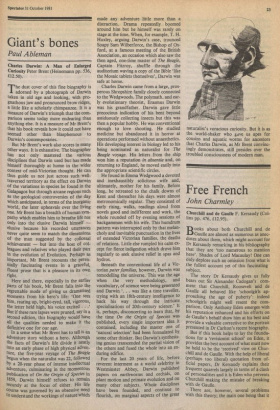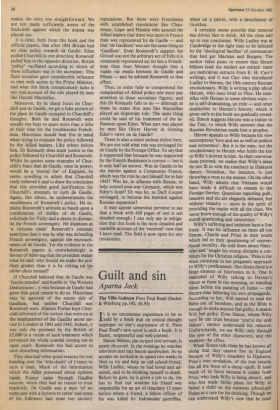Free French
John Charmley
Churchill and de Gaulle F. Kersaudy (Collins pp. 476, f12.95).
Books about both Churchill and de 1-.3 Gaulle are almost as numerous as anecdotes about them, which might account for Dr Kersaudy remarking in his bibliography that they are 'too numerous to mention here'. Shades of Lord Macaulay! One can only deplore such an omission from what is the fullest account yet of this fascinating subject.
The story Dr Kersaudy gives us fully bears out Sir Alexander Cadogan's comment that Churchill, Roosevelt and de Gaulle all behaved like 'schoolgirls approaching the age of puberty': indeed schoolgirls might well resent the comparison. Only Anthony Eden emerges with his reputation enhanced and his efforts on de Gaulle's behalf show him at his best and provide a valuable corrective to the portrait presented in Dr Canton's recent biography.
But if this book helps to lay the foundations for a 'revisionist school' on Eden, it provides the best account of what must now be held to be the 'received' view on Churchill and de Gaulle. With the help of liberal (Perhaps too liberal) quotation from official papers, Dr Kersaudy explains their frequent quarrels largely in terms of a clash of personalities and it is Eden who prevents Churchill making the mistake of breaking with de Gaulle.
.There are, however, several problems with this theory; the main one being that it makes the story too straightforward. We are not made sufficiently aware of the backcloth against which the drama was played out.
It is clear, both from this book and the official papers, that after 1941 Britain had no clear policy towards de Gaulle: Eden pulled Churchill in one direction; Roosevelt pulled him in the opposite direction. British 'policy' vacillated according to which of these influences was in the ascendant. This fluid situation gave considerable influence to men with access to the Prime Minister, and what this book conspicuously lacks is any real account of the role played by men like Harold Macmillan.
Moreover, by its sharp focus on Churchill and de Gaulle, we get a false picture of the place de Gaulle occupied in Churchill's thoughts. Both he and Roosevelt were usually too busy to spare more than a tithe of their time for the troublesome Frenchman. Historians should bear this in mind when trying to evaluate the policy followed by the Allied leaders. Like others before him, Dr Kersaudy does scant justice to the policy followed by Churchill and Roosevelt. Whilst he quotes some examples of Churchill's fears that de Gaulle, once in power, would be a 'mortal foe' of England, he seems unwilling to admit that Churchill really believed it and to draw the conclusion that this provided good justification for Churchill's attempts to curb de Gaulle. Again, like others, he underestimates the sensibleness of Roosevelt's policy. He explains Roosevelt's attitude as based upon a combination of dislike of de Gaulle, solicitude for Vichy and a desire to dismantle the French sovereignty. He dismisses as 'a virtuous cloak' Roosevelt's constant assertions that it was he who was defending French sovereignty, against the encroachments of de Gaulle. Yet the evidence in the Roosevelt papers is overwhelmingly in favour of believing that the president meant what he said: why should we make the problem greater than it is by relying on his °biter dicta instead?
If Churchill believed that de Gaulle was 'fascist-minded' and hostile to 'the Western Democracies', it was because de Gaulle had given him good reason to do so. Historians may be ignorant of the seamy side of Gaullism, but neither Churchill nor Roosevelt were. Alastair Forbes kept Churchill informed of the torture that went on at the headquarters of the Gaullist secret service in London in 1941 and 1942. Indeed, it was only the payment by the British of £5,000 to a victim of such treatment which prevented the whole scandal coming out in open court. Roosevelt too had access to such disturbing information.
They also had other good reasons for not handing over the `title-deeds' of Prance to such a man. Much of the information which the Allies possessed about opinion inside France came through Gaullist sources, which they had no reason to trust implicitly. De Gaulle was a man 'of no name and with a fortune to come' and some of his followers had none too savoury reputations. But there were Frenchmen with established reputations like Chautemps, Leger and Flandin who assured the Allied leaders that there was more in France than was represented by de Gaulle — and that 'de Gaullism' was not the same thing as 'Gaullism'. Even Roosevelt's support for Giraud was not the arbitrary act of folly it is commonly represented as; no less a Frenchman than Jean Monnet thought him a viable via media between de Gaulle and Petain — and he advised Roosevelt to that effect.
Thus, in order fully to comprehend the complexities of Allied policy one must pay attention to these secondary figures, and this Dr Kersaudy fails to do — although at times he states that men like Macmillan played an important role. The same thing could be said of his treatment of the influences upon Eden. What part was played by men like Oliver Harvey in forming Eden's views on de Gaulle?
There is also a more serious defect here. We are not told what role was envisaged for de Gaulle by the Foreign Office. To say that it supported him because he was supported by the French Resistance is correct — but it is only half an answer. Was de Gaulle to be the barrier against a Communist France, which was the role he cast himself for in late 1943? Was he, in alliance with Russia, to help control post-war Germany, which was Eden's hope? Or was he, as Duff Cooper envisaged, to become the bulwark against Russian expansion?
It may appear somewhat perverse to say that a book with 429 pages of text is not detailed enough; I can only say in mitigation that this book is the most detailed and readable account of the 'received' view that I have read. The field is now open for any revisionists.







































 Previous page
Previous page